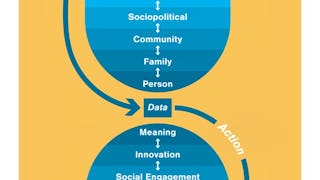This first of five courses introduces students to the social determinants of health, and provides an overview of the definitions and theoretical perspectives that will form the foundation of this specialization. The topics of this course include:

Cultivez votre carrière grâce à des programmes dirigés par des experts, des certificats prêts à l'emploi et des moyens d'évoluer sur 10 000 . Le tout pour 25 $US/mois, facturé annuellement. Économisez


Introduction to Social Determinants of Health
Ce cours fait partie de Spécialisation Social Determinants of Health: Data to Action


Instructeurs : Daniel J. Pesut, Ph.D., RN, FAAN
Inclus avec 
(14 avis)
Détails à connaître

Ajouter à votre profil LinkedIn
8 devoirs
Découvrez comment les employés des entreprises prestigieuses maîtrisent des compétences recherchées

Élaborez votre expertise du sujet
- Apprenez de nouveaux concepts auprès d'experts du secteur
- Acquérez une compréhension de base d'un sujet ou d'un outil
- Développez des compétences professionnelles avec des projets pratiques
- Obtenez un certificat professionnel partageable


Obtenez un certificat professionnel
Ajoutez cette qualification à votre profil LinkedIn ou à votre CV
Partagez-le sur les réseaux sociaux et dans votre évaluation de performance

Il y a 5 modules dans ce cours
The purpose of this module is to provide an introduction to the social determinants of health in the context of this specialization. In lesson one, we will define the social determinants of health, explore how our understanding of social determinants has changed over time, and analyze the impact health inequity has on society. We will also consider the variety of transformational ideas that can be used to address health inequities. In lesson two, we will review different ways of knowing and how community knowledge can be augmented with data to influence policy. We will also evaluate defining characteristics of data, as we assess how data, analysis and partnership can be leveraged to create power for transformative change.
Inclus
4 vidéos10 lectures2 devoirs1 sujet de discussion8 plugins
The purpose of this module is to provide a foundation of theoretical knowledge to support systems thinking and knowledge management principles applied to determinants of health. Systems thinking involves making distinctions, understanding systems, relationships, points of view and perspective taking. In lesson one, we will learn about the DSRP theory in regard to developing a systems thinking mindset. In lesson two, we introduce the Data to Action Hourglass model as a conceptual framework and a way to think about the different logical levels and relationships between and among determinants of health.
Inclus
2 vidéos4 lectures2 devoirs1 sujet de discussion3 plugins
The purpose of this module is to introduce the concept of collective impact as a model and method for designing data driven collective impact initiatives. The principles and phases of collective impact are described and explained. Collective impact thinking requires a shift in mind that requires attention to systems thinking. Using a collective impact mindset supports and encourages collaboration and team science and the use of standardized data sets to understand and support knowledge work and translation with community and population data sets. Example case studies illustrate the power and potential of collective impact efforts to create transformational changes to support desired health care futures.
Inclus
1 vidéo6 lectures2 devoirs1 sujet de discussion1 plugin
In this module we will define minority stress theory as it relates to the social determinants of health. In lesson one, we will define minority stress, and examine how systemic discrimination contributes to minority stress. We will also look at how minority stress can lead to health disparities. In lesson two, we will discuss the effects of structural inequalities on both advantage and disadvantaged groups. We will also explore the personal, interpersonal and social effects of minority stress. Finally, we will evaluate the personal and social resources available to counteract minority stress, as well as the ways in which data can be used to enact transformative changes.
Inclus
2 vidéos2 lectures2 devoirs1 sujet de discussion3 plugins
This module will focus on analyzing, displaying and interpreting social determinants of health data, with a particular focus on identifying social determinants of health in large datasets. Lesson one will provide an overview of frequency analyses and bar chart visualizations. In lesson two, we will learn how to use the R environment in Coursera. Lesson three will introduce us to the datasets, NHANES and Omaha System, which we will use throughout the Data Application modules in this specialization. In lesson four, we will learn how to conduct frequency analyses and create bar charts in R. Using the NHANES dataset, we will obtain the frequencies of income, education, family savings, depression and insurance by race. Using the Omaha System dataset, we will obtain the frequencies of common social determinants by both race and ethnicity. Finally, we will discuss how to interpret the results of our analysis as we visualize our findings using bar plots.
Inclus
4 vidéos6 lectures1 évaluation par les pairs1 sujet de discussion1 laboratoire non noté4 plugins
Instructeurs


Offert par
Recommandé si vous êtes intéressé(e) par Health Informatics


University of Minnesota


University of Minnesota


University of Minnesota


University of Michigan
Pour quelles raisons les étudiants sur Coursera nous choisissent-ils pour leur carrière ?





Ouvrez de nouvelles portes avec Coursera Plus
Accès illimité à 10,000+ cours de niveau international, projets pratiques et programmes de certification prêts à l'emploi - tous inclus dans votre abonnement.
Faites progresser votre carrière avec un diplôme en ligne
Obtenez un diplôme auprès d’universités de renommée mondiale - 100 % en ligne
Rejoignez plus de 3 400 entreprises mondiales qui ont choisi Coursera pour les affaires
Améliorez les compétences de vos employés pour exceller dans l’économie numérique
Foire Aux Questions
Access to lectures and assignments depends on your type of enrollment. If you take a course in audit mode, you will be able to see most course materials for free. To access graded assignments and to earn a Certificate, you will need to purchase the Certificate experience, during or after your audit. If you don't see the audit option:
The course may not offer an audit option. You can try a Free Trial instead, or apply for Financial Aid.
The course may offer 'Full Course, No Certificate' instead. This option lets you see all course materials, submit required assessments, and get a final grade. This also means that you will not be able to purchase a Certificate experience.
When you enroll in the course, you get access to all of the courses in the Specialization, and you earn a certificate when you complete the work. Your electronic Certificate will be added to your Accomplishments page - from there, you can print your Certificate or add it to your LinkedIn profile. If you only want to read and view the course content, you can audit the course for free.
If you subscribed, you get a 7-day free trial during which you can cancel at no penalty. After that, we don’t give refunds, but you can cancel your subscription at any time. See our full refund policy.
Plus de questions
Aide financière disponible,

